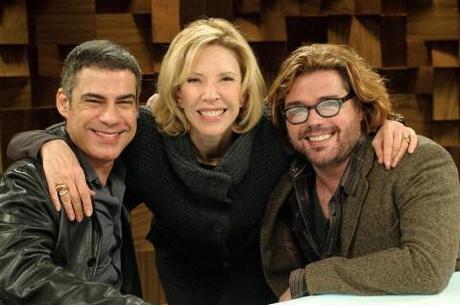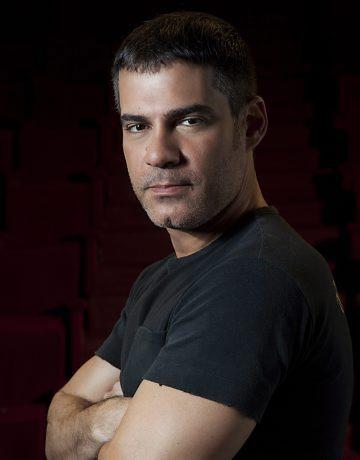This is Your Life!

Claudio Botelho, TV interviewer Marilia Gabriela & Charles Moeller (atelevisao.com)
Picking up where we left off, we continue with the biographies of the Brazilian Kings of Musical Theater. Today’s subject is the versatile actor, singer, musical director, adapter, composer, translator and lyricist Claudio Botelho, one of the major names of musical theater in Brazil.
Born in the town of Araguari (in the state of Minas Gerais), Claudio Botelho Pacheco was raised in Uberlândia, a major city. “One of the first words I remember uttering was ‘radio.’ I loved listening to the radio, and I used to go crazy when a band would go down my street. I was a child of the 1970s, in the countryside of Minas Gerais, and the local bands would pass right under my window!
“Music played a large part in my upbringing,” he recalled. “My grandmother Raúla, my mother’s mother, was a violinist who worked in movie theaters when live music was the norm. My grandfather Nenê, my father’s father, used to play the accordion. No doubt their genes had an effect on my life.”
What about the theater? “Theater? I didn’t know such a thing existed. There weren’t many theaters in Uberlândia in the decade of the 70s. The biggest cultural event in the city was the annual show put on by pop star Roberto Carlos, who appeared at a soccer stadium directly across from our house.”
It was during these formative times that Claudio came into contact with the song output of many of the era’s top singing sensations, Chico Buarque chief among them.
“Our household was filled with the mellow sounds of Silvio Caldas and Nelson Gonçalves, who were my family’s favorites. When I first heard Chico, whose voice was nothing extraordinary, I went into shock. But little by little, as I listened closely, again and again, to his lyrics, what I initially thought was outlandish turned out to be a revelation: Chico Buarque quickly became my idol.”
In 1978 — coincidentally, the same year that Chico’s musical play, Ópera do Malandro (“The Street Hustler’s Opera”), made its premiere there — Claudio’s family uprooted itself and moved to Rio de Janeiro.
“My mother was invited to become the coordinator of the Sacré Coeur de Marie School in Rio… We went to live in Copacabana. That’s where the piano first entered my life: my aunt Maria Helena, who already lived there and would become our guardian angel, had a piano in her house. Whenever I used to visit her, I’d go directly to her piano. And that’s how I learned to play, by myself.
“In 1980, I changed schools from Sacré Coeur to São Vicente de Paulo, where there was a strong artistic movement and more progressive air; that’s when I experienced a rebirth. It was there that I discovered a wider world than I had known in Uberlândia, that I began to understand and appreciate Rio de Janeiro which opened my eyes to a new life.”

Actor, singer, musical director Claudio Botelho (nabroadway.com)
That “new life” Claudio hinted at would comprise a career in musical theater. First, he began by studying theater at UNI-RIO, then letters at the State University of Rio (UERJ), graduating as an actor at the Art House of Laranjeiras (Casa das Artes de Laranjeiras – CAL).
After several youthful ventures, including an early adaptation of Ferenc Molnár’s play, The Paul Street Boys, he almost gave up his dream of ever being on the stage. In a burst of “arrogance and audacity,” as he politely phrased it, Claudio went straight to the theater where actor, writer and director Ary Fontoura was appearing and, as Lady Luck would have it, convinced Fontoura to hear him out as Claudio presented his own musical version of Charles Dickens’ Oliver.
“Ary must have thought it the oddest thing in the world… He told me (with all the patience of Job) that my version of Oliver would be difficult to produce, with more than 30 characters on stage, that he couldn’t possibly do it. However, he was about to put on a play that he was writing with a friend, in which he’d thought about inserting some music. Would I be interested?”
Indeed, he was. Not only did Claudio compose the score to Moça, Nunca Mais (“No More a Woman”), he also rewrote the song lyrics (“I thought the originals were awful”). After several more such endeavors, and many “ups and downs” in the musical-theater market, he started to rub elbows with other well-known theater personalities, to include the late Sergio Britto, Miguel Falabella and Ítalo Rossi.
During rehearsals for Rossi’s 1989 mounting of Tadeusz Rózewicz’s White Wedding (“Casamento Branco”), in the audience Claudio noticed “a young man with golden curls who answered to the name of Charles Möeller. He played Miguel Falabella’s son in a TV soap opera and was attending his friend’s rehearsal that day — and that’s how it all started.”
(To be continued…)
(The above information was compiled from the Möeller-Botelho Website, along with various excerpts from Tania Carvalho’s book, Os Reis dos Musicais, published by Imprensa Oficial, São Paulo, 2009. English translation by Josmar Lopes, with grateful acknowledgement to Charles Möeller and Claudio Botelho)
Copyright © 2014 by Josmar F. Lopes

